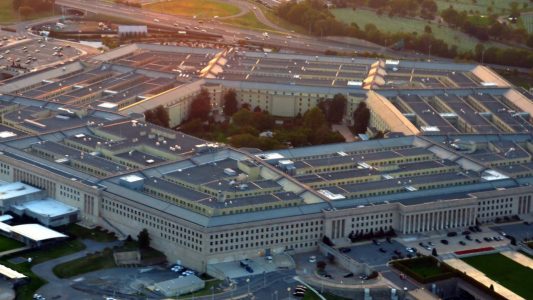
US labels Lebanon bank with Hezbollah ties as global terrorist
The U.S. designated Lebanon-based Jammal Trust Bank a “global terrorist” Thursday over its ties to the Iran-backed Hezbollah terror group, one day after it slapped sanctions on Iranian networks it claimed facilitated “tens of millions of dollars’ worth” of activities that benefited Iran’s military and regime.
Washington, in partnership with Oman, also announced sanctions against four individuals accused of moving tens of millions of dollars between Iran’s elite Quds Force and the military wing of the Islamic militant group Hamas in Gaza.
“Treasury is targeting Jammal Trust Bank and its subsidiaries for brazenly enabling Hezbollah’s financial activities,” Under Secretary for Terrorism and Financial Intelligence Sigal Mandelker said in a statement. “Corrupt financial institutions like Jammal Trust are a direct threat to the integrity of the Lebanese financial system. Jammal Trust provides support and services to Hezbollah’s Executive Council and the Martyrs Foundation, which funnels money to the families of suicide bombers.”
On Wednesday, the Treasury Department sanctioned two Iranian networks that it says engaged in “covert procurement activities benefitting multiple Iranian military organizations.”
One of the now-sanctioned networks used a front company in Hong Kong to evade sanctions imposed by the U.S. and other nations, and oversaw “tens of millions of dollars’ worth” of activity that targeted U.S. technology on behalf of people tied to the Islamic Revolutionary Guard Corps (IRGC) and the regime’s missile program, according to the Treasury Department.
The second network acquired aluminum alloy products for entities controlled or owned by the Iranian Ministry of Defense and Armed Forces Logistics.
The Treasury Department’s statement accused several Iranian nationals of playing critical roles in the schemes. Two of them, Hadi and Hamed Dehghan — along with the latter’s company, Ebtekar Sanat Ilya — had several Iranian military clients, including Rastafann Engineering Company, the DOJ said. It’s unclear if the men are related.
Rastafann had provided support to Iran’s Naval Defense Missile Industry Group and the IRGC in the past. Ebtekar Sanat Ilya company also had customers including Iran Aircraft Manufacturing Industrial Company (HESA), the Shahid Bakeri Industrial Group (SBIG) and the Shahid Hemmat Industrial Group (SHIG).
“Since 2017 alone, these actors have used a network of intermediary companies, including a Hong Kong-based front company, to facilitate more than 10 million dollars’ worth of proliferation-related transactions,” Treasury said.
Hamed Dehghan also owned Hong Kong-based Green Industries, which he used as a front to buy military equipment from U.S. suppliers on behalf of Iranian entities that could not purchase the equipment otherwise because they were blacklisted for being involved in activity surrounding Iran’s weapons of mass destruction, authorities said.
A third Iranian national, Seyed Hossein Shariat, owned Asre Sanat Eshragh Company, which for years obtained aluminum alloy products for several Iranian organizations.
“Since at least 2016, Asre Sanat Eshragh Company has procured large amounts of aluminum alloy products for multiple Iranian entities, including Iran Electronic Industries (IEI) and Iran Aviation Industries Organization (IAIO),” according to the Treasury Department.
“As the Iranian regime attempts to use complex schemes to hide its efforts to bolster its WMD [weapons of mass destruction] program, the U.S. government will continue to thwart them at every turn,” Mandelker said.
Iranian President Hassan Rouhani this week walked back the idea of possible talks with President Trump regarding the countries’ nuclear impasse, saying Iran would meet with the U.S. only if Trump agreed to lift sanctions.
“Without the U.S.’ withdrawal from sanctions, we will not witness any positive development,” Rouhani said in a speech Tuesday. “If someone intends to make it as just a photo-op with Rouhani, that is not possible.”
Trump had said Monday, during the close of the G-7 summit in France, that there was a “really good chance” he and Rouhani could meet. French President Emmanuel Macron had tried to intervene at the G-7 summit and bring the nations together.
Source: Fox News





